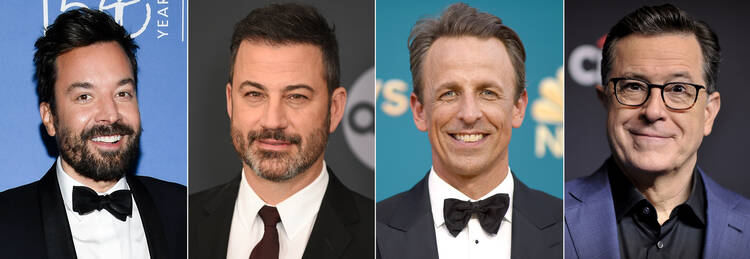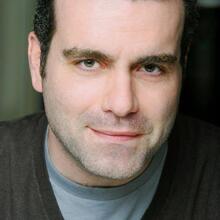“Let’s not get carried away with this whole religion thing, okay?” That was my mother’s response when my 8-year-old self asked if I could sign up to be an altar server at our parish. I nodded plaintively at her dismissal and swallowed my disappointment. I went back to eating my Cheerios, while she continued sipping her coffee and picking at a bran muffin, while “Good Morning America”blasted on our kitchen television set that September morning.
Some 20 years later, when I told my mother that I had a vocation to the priesthood—having spent the previous six years attempting to be a comedian in my hometown of Chicago—my mother’s response was not dissimilar to that of all those years before: “Don’t you think you’re getting a little carried away with this religion thing? Couldn’t you just be one of those guys who carries the basket on the long stick and collects money during Mass?” I nodded and went back to my coffee, while she picked at a bran muffin and turned her attention back to Oprah on the kitchen television set.
In the new podcast, “Strike Force 5,” Jimmy Fallon, Stephen Colbert, Jimmy Kimmel and John Oliver all admitted to a desire for Holy Orders.
My vocation story is not an orthodox one, if you’ll pardon the pun, but demonstrates how our God works outside, inside and beyond all the boxes. I was not an altar server, I did not even believe in God for a good portion of my adolescence and early adulthood, and yet here we are. Here I am.
I got to thinking about my vocation story recently while listening to “Strike Force Five,” the limited-run podcast featuring five of the most prominent names in late-night television, when halfway through the premiere episode, Jimmy Fallon—in response to Stephen Colbert’s admission that his mother went on a date with the former Nicaraguan dictator Anastasio “Tacho” Somoza—revealed that his mother had entered a convent…for a week.
Fallon’s disclosure led to further revelations by four of the five members of the titular Strike Force, that they had all wanted to be priests at some point during their youth. Indeed, Fallon, Colbert, Jimmy Kimmel and John Oliver all admitted to a desire for Holy Orders, as the former catechism teacher Colbert rightly referred to it, with only Seth Meyers, who unapologetically stated that the “next church I go into will be the first church I go into,” being the outlier. (Fallon, Colbert and Kimmel were all raised Catholic; Oliver hails from the Church of England.)
“Strike Force Five,” as the name suggests, was born out of the Writer’s Guild of America (W.G.A) strike, which began on May 2 of this year, as a means of providing financial support to their unemployed staffs while production on their shows was shut down, until the strike ended on Sept. 27. Debuting on Aug. 30, the show consists of 10 episodes thus far, which attempt to answer the question posed by Kimmel in the opening moments of the first podcast: “What would happen if five of America’s top 11 beloathed talk show hosts all talked on top of each other for an hour?”
Here they are: Colbert, Fallon, Kimmel, Oliver and Seth, siding with the worker, using their gifts and talents in the best way they can to be of service to those around them.
The podcast is a wonderfully meandering, oftentimes uneven and frequently hilarious diversion that perfectly demonstrates why all five of the men are in the positions they are in today, while simultaneously demonstrating, through their absence, why all five very much need writers and a staff to maximize their comedic potential.
But back to the priest thing. Though the five don’t go into an extensive analysis of their childhood desire to be clerics, both Fallon and Kimmel contend that their fleeting interest in the priesthood was a result of their time as altar servers. As Kimmel says: “Don’t you think all altar boys have that thought at some point? You’re there with this man who gets so much respect....” Oliver then chimes in that when he was a boy and spoke to his father of his hopes of being a vicar, his father responded, “No, you just want people to listen to you.”
As a priest who had very little interest in being a member of the clergy in my childhood and who, conversely, had a strong yearning to be David Letterman, Bill Murray or Gilda Radner, depending on the day, listening to five titans of comedy speak of their boyhood yearnings to be clerics was rather startling. And while my initial reaction was not dissimilar to that of Oliver’s father (“you just wanted people to pay attention to you”), that response sells them short. And really sells my own vocation short as well.
There was a time in my early 20s, long before I would believe in God again, let alone consider the possibility of being a priest, when as a hopeful comedian, working a day job answering phones, I received a call notifying me that I did not get a job I had been up for.
I don’t remember what the job was—there were hundreds, perhaps thousands of comedy gigs I did not get—but I will never forget that as I hung up the phone and felt that invisible stone of rejection dropping in my stomach (as it always did), I said to myself, “maybe I’m doing all of this for different reasons than I think.”
My response in the moment was a literal and metaphorical shake of the head, as if to say, “That cannot be; this is my destiny.” But as it turned out, my little voice was correct and my destiny was something, somewhere, someone else.
Still, it’s important for me (and since you’re reading this, you also, dear reader) to recognize that nothing was wasted in those years of shows in dark and smelly clubs: those nights of flop-sweat and no laughs at bars; of “Thanks, but no thanks” at auditions; of “You were terrific, hilarious tonight” in the snow laden street outside the theater. It was all a part of God’s economy, and it was all as essential to my formation as a priest as my class on the Gospel of John was in seminary.
Conversely, for those four men, who once were boys who hoped to be priests so many decades ago, there was nothing wasted in their aspirations, either. And it was not just because they wanted attention or wanted to be heard or listened to, as all children do. It was because they wanted to do good and they saw in the priests around them men who did good and who inspired those around them to do good. And so here they are: Colbert, Fallon, Kimmel, Oliver and Seth (because there’s always a seat at the table for the secular humanist) as the Strike Force Five, siding with the worker, using their gifts and talents in the best way they can to be of service to those around them.








